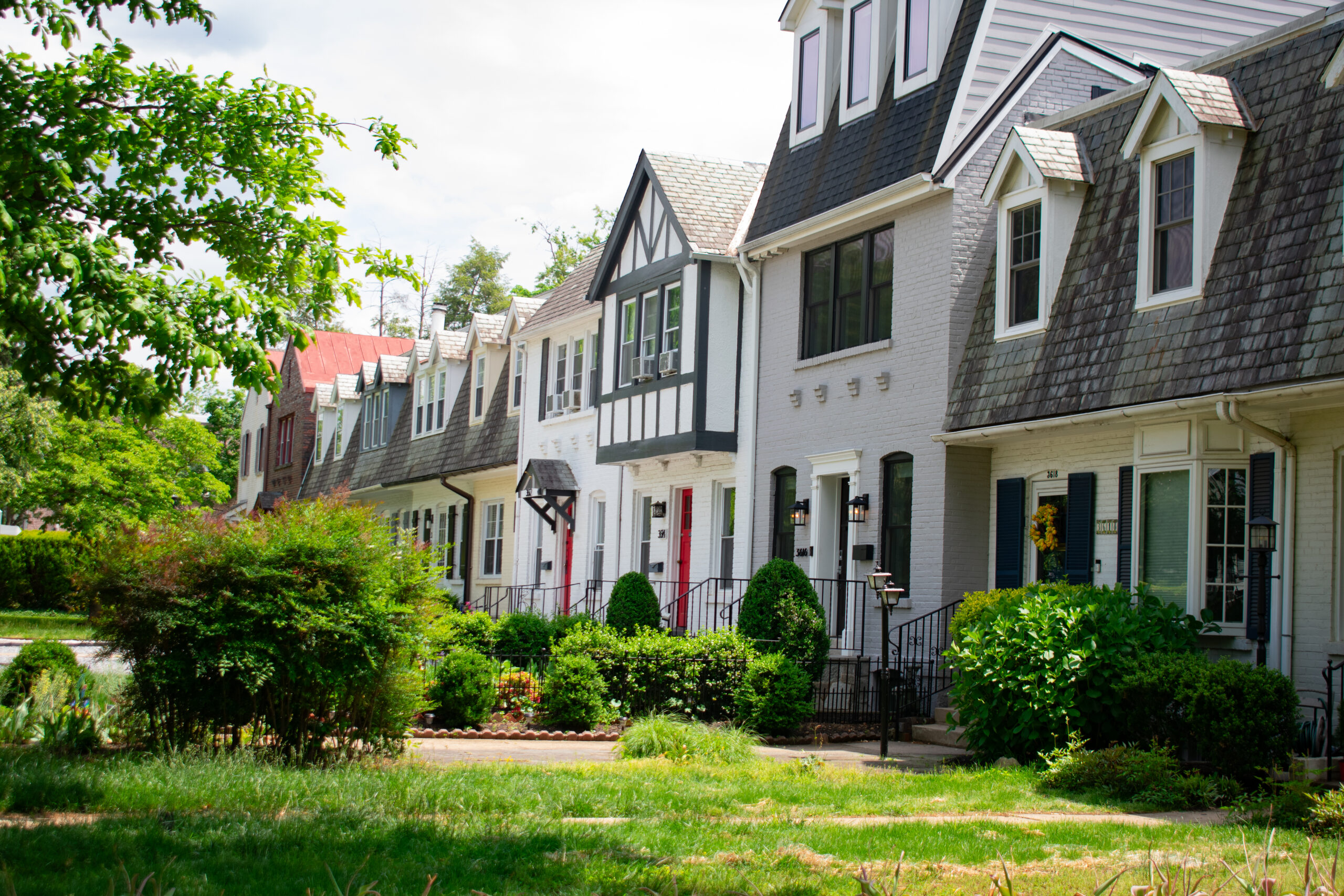Rylie Hannon (CAS ’27) started looking for senior off-campus housing at the beginning of fall, nearly two years before she planned to move in. While Hannon partially attributes starting the search this early to her housing wishlist—jokingly calling her group’s ideal home “the Barbie Dream House”—her search timeline isn’t out of the ordinary for Georgetown students.
Many students who are planning to live off campus senior year start looking for housing as early as the beginning of their sophomore year. On Georgetown’s Off-Campus Housing Website, several listings aren’t available until the 2026–2027 or 2027–2028 school year.
House-hunting students attribute this trend to a snowball effect: when underclassmen see their peers beginning their searches in earnest, they feel pressure to do the same. After Hannon returned from winter break, she noticed other sophomores starting to commit to leases.
“That was when a lot of people started signing, until we kind of got antsy. We would tour a house, and then, before everyone could see it, it was already signed. So that was a little nerve wracking,” Hannon said.
Ryan Wen (SOH ’27) toured over 20 properties before landing on a final house in Burleith. Wen noted the impact that upperclassmen can have on perceptions of the housing process.
“When underclassmen talk to upperclassmen, they’ll recommend that they start early just to avoid the whole craze of last-minute housing and signing a lease for a house that you’re not exactly happy with. And so, year by year, people will start looking earlier, and that pushes the entire timeline for everybody up,” Wen said.
While some students sign leases their sophomore year, others wait to do so and are still able to find housing options. Jack Markowitz (CAS ’27), who signed on a Burleith house in January, attributes at least part of the rush to outside pressures and perceptions that may not accurately reflect the availability of housing.
“I also know people that got their housing end of their junior year, and then it’s totally fine, or people that are starting to get housing now [in April], and it’s even closer than where we’re living. So you don’t have to stress about it as much as I did. I just felt the pressure,” Markowitz said.
Some rental sites don’t recommend signing a lease more than a month in advance, though it’s not uncommon for students in competitive rental markets near colleges to sign earlier than the norm. In some cities, this competition has led to changes to local regulation. In Ann Arbor, where many University of Michigan students rent housing for more than a year, legislation prevents landlords from sending renewal offers or showing their properties until at least 180 days into an existing lease. However, the Voice found no similar laws in D.C.
Students said that one of their concerns with signing a lease so early is the need to remain on good terms with future roommates. While breaking a lease is a possibility, it can be an expensive proposition; depending on the lease agreement, tenants may have to pay an early termination fee or continue paying rent.
“Obviously those are my best friends, and so I expect to be friends with them senior year, but now I’m legally obligated to be friends with them senior year. I am in a binding contract,” Hannon said.
Torr Zielenski (CAS ’27), who signed a lease for a property in West Georgetown, echoed a similar concern.
“I’ve talked to a lot of people that are worried that they’re not gonna be friends with the people that they’re living with senior year, and so they’re kind of in this position where they have to maintain these really close connections and feel kind of closed-off from meeting a lot of new people,” Zielenski said.
At Georgetown, living on campus three out of four years is a requirement. The university doesn’t guarantee housing to seniors unless they demonstrate “high financial need,” but students can apply for senior eligibility for on-campus housing. Regardless, many students prefer to live in off-campus houses for their final year in order to have single bedrooms, larger living spaces, and often lower costs.
Markowitz decided to live off campus because it was less expensive when factoring in the price of the required meal plan that comes with living on campus, even as a senior. The house also has more space and allowed him to choose his roommates without regard to gender.
“Idealistically, again, the idea of living off campus is really appealing, especially because this is our only year that you can do it, is your senior year,” Markowitz said.
The university hopes to retain more students on campus with the construction of the New Residential Complex, formerly called Henle Village. The complex includes amenities like in-unit washers and dryers, as well as some units with single bedrooms. Wen, who will be living in the building as a junior next school year, decided against this option for senior year.
“We did think about it, but then at the end of the day, the off-campus housing option is still cheaper than if we paid a full year in Henle. And we knew we would all have singles, and so that kind of just offset any benefit that Henle would have for us,” Wen said.
What students are prioritizing in their off-campus housing search can impact how long the process takes. Distance from campus, pest management, price, number of bedrooms, and more can all play a role in the decision. Finding a house that checks every box can be a daunting process, especially for first-time renters.
Zielenski didn’t tour any houses before signing his West Georgetown lease. Hannon contacted 32 landlords and toured nine properties before settling on a Burleith property.
“I think that our type A personalities also made this process longer earlier. But, I know that the house that we’re living in doesn’t have mold, it doesn’t have rats, it doesn’t have bugs,” Hannon said.
Pests are an ongoing concern for students as Georgetown, and the District at large, contend with rat problems. Wen encountered rodents while touring houses, as well as other maintenance issues.
“One of the houses we saw literally had rat traps with animals still in them when we toured, so that was just kind of something that caught us off guard,” Wen said. “And it’s not an uncommon scene to see because I think a lot of landlords aren’t as incentivized to keep the property as up-to-date or as maintained, just because they know these college students are looking for housing, and that they’re going to sign on something.”
Property owners in Washington, D.C. are legally required to obtain a Basic Business License (BBL) before renting to tenants, which includes an inspection of the property. While the inspection checklist includes items like cleanliness and temperature control, it doesn’t explicitly mention pests, though the housing code requires landlords to keep their buildings rodent free. According to the Georgetown Student Tenant Association’s website, as many as 50% of Georgetown houses don’t have a current BBL.
Ria Maheshwari (CAS ’26), the director of the Georgetown Student Tenant Association, attributes this gap to several causes. In many cases, the license has simply expired and needs to be renewed. There are also circumstances where the building has a code issue that must be resolved. Maheshwari has encountered falsified credentials in the past.
“In those situations, those people are typically subletting instead of having a proper lease agreement, or something is wrong in the lease that students should identify is an issue and not sign the lease in the first place. But because they’re so desperate for housing in the area, they get into situations where they’re probably not supposed to be in,” Maheshwari said.
Finding an attentive landlord was one of Hannon’s biggest priorities during the housing search.
“Landlords, and them following the rules and following tenant code, was really important to us,” she said.
Hannon tried to vet property owners by using Georgetown’s Off-Campus Housing Website, talking with landlords, and speaking to tenants. The Off-Campus Housing Website is managed by the Office of Neighborhood Life and only includes properties with a verified BBL, according to a university spokesperson.
Maheshwari has counseled several students through lease disputes and other issues with their landlords.
“I feel like in the Georgetown area, landlords have a really big advantage of being very experienced in the area,” Maheshwari said. “They’ve been landlords for these specific properties for multiple years. So for them, it’s really easy to exploit a student who probably hasn’t lived in the area ever before.”
The Voice reached out to several landlords listed on the Off-Campus Housing Website. They did not respond to requests for comment.
Regardless of the challenges that the house hunting process can bring, Markowitz said that student culture can exaggerate the urgency to start the process early.
“Once you start thinking about it, you start talking to other people, and they’re like, ‘Oh, well, I signed my lease just now.’ And it feels like everyone’s doing it, so you have to too, but it’s not the case. It’s a really kind of skewed perspective, depending on how you look at it, either way,” Markowitz said.






